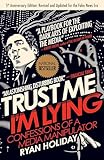Trust me, I'm lying : confessions of a media manipulator / Ryan Holiday.
Material type: TextLanguage: English Publication details: New York, NY : Portfolio/Penguin, 2013.Description: xvii, 325 pages : illustrations (black and white) ; 22 cm.ISBN:
TextLanguage: English Publication details: New York, NY : Portfolio/Penguin, 2013.Description: xvii, 325 pages : illustrations (black and white) ; 22 cm.ISBN: - 9781591846284
- HF5415 .H65 2013
| Item type | Current library | Call number | Status | Date due | Barcode |
|---|---|---|---|---|---|
 Recommended bibliography book
Recommended bibliography book
|
TBS Barcelona | HF5415 HOL (Browse shelf(Opens below)) | Available | B04496 |
Includes bibliographical references and index.
Blogs make the news — How to turn nothing into something in three way-too easy steps — Blogs as a business : a brief overview — Tactic #1: bloggers are poor, help pay their bills — Tactic #2: tell them what they want to hear — Tactic #3: give them what spreads, not what's good — Tactic # 4: help them trick their readers — Tactic #5: sell them something they can sell (exploit the one-off problem) — Tactic #6: make it all about the headline — Tactic #7: kill 'em with pageview kindness — Tactic #8: use the technology against itself — Tactic #9: just make stuff up (everyone else is doing it) — The monster attacks : what blogs mean — Irin Carmon, the daily show, and me: the perfect storm of how toxic blogging can be — There are others : the manipulator hall of fame — Cute but evil : online entertainment tactics that drug you & i — The link economy : the leveraged illusion of sourcing — Extortion via the web : facing the online shakedown — The iterative hustle : online journalism's bogus philosophy — The myth of corrections — Cheering on our own deception — The dark side of snark : when internet humor attacks — The 21st century degradation ceremony : blogs as machines of hatred and punishment — Welcome to unreality — How to read a blog : an update on account of all the lies — Conclusion.
Trust Me, I’m Lying was the first book to blow the lid off the speed and force at which rumors travel online—and get "traded up" the media ecosystem until they become real headlines and generate real responses in the real world. The culprit? Marketers and professional media manipulators, encouraged by the toxic economics of the news business.
Whenever you see a malicious online rumor costs a company millions, politically motivated fake news driving elections, a product or celebrity zooming from total obscurity to viral sensation, or anonymously sourced articles becoming national conversation, someone is behind it. Often someone like Ryan Holiday.
As he explains, “I wrote this book to explain how media manipulators work, how to spot their fingerprints, how to fight them, and how (if you must) to emulate their tactics. Why am I giving away these secrets? Because I’m tired of a world where trolls hijack debates, marketers help write the news, opinion masquerades as fact, algorithms drive everything to extremes, and no one is accountable for any of it. I’m pulling back the curtain because it’s time the public understands how things really work. What you choose to do with this information is up to you.”


